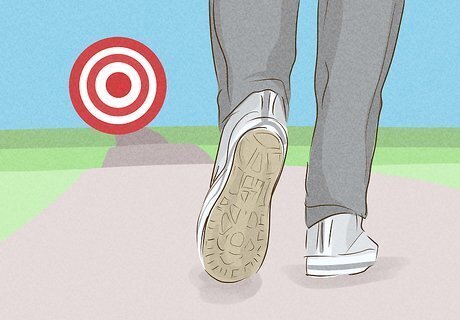
views
Having a Positive Mindset

Start each day with a smile. Wake up every morning with the attitude that it's a brand new day. Let go of anything that might have happened the day before, and approach today with the idea that anything can happen. It might help to put a reminder on your phone or on a note next to your bed so you can see it when you first wake up. You might write something like, "Be happy!" or "It's a new day!" It could even be something as simple as a smiley face.

Laugh more. Laughing can help put you in a better mood, so look for any opportunity to get a chuckle. That might mean spending time with your most hilarious friends, watching movies or TV shows that hit your funny bone, or following meme groups on social media. If you can't find anything to laugh at, try simply laughing out loud. Even if you have to fake it at first, it probably won't be long before you realize your giggles are real. Laughter is a great stress reliever, and it's actually physically good for your body—especially your heart, lungs, and muscles.

Make time every day for self-care. Self-care just means taking care of your body and mind. For instance, every day, try to eat healthy, nutritious meals that will give your body the fuel it needs, and exercise for about 30 minutes several days a week to keep yourself healthy and strong. In addition, try to stick to a regular schedule and get plenty of sleep every night—it's hard to feel positive and healthy when you're sleep-deprived. In addition to living an overall healthy lifestyle, your self-care might include relaxing, spending time with your friends, participating in your favorite hobbies, listening to music, or anything else that makes you feel like you're living your best life.

Replace negative thoughts with positive ones. It's natural and normal to doubt yourself sometimes—everyone does it. However, that doesn't mean you should embrace negative thoughts about yourself. Throughout each day, stop and evaluate your thoughts about yourself. If your thoughts are unkind, try to reframe them into something positive. For example, if you're faced with something difficult, instead of thinking, "I can't do that," you might think, "I'm excited to try something new." If you're feeling lonely, you might replace the thought, "No one likes me," with something like, "Tonight I'll spend time reaching out to old friends."

Start a daily gratitude practice to remember what you're thankful for. Intentionally set aside a little time each day to contemplate the things you're grateful for in life. You can simply think these things to yourself, you can say them out loud, or you can write them in a daily gratitude journal. It's okay if it's something small—the idea is that by focusing on having a spirit of gratitude, it will be easier to find new things to be thankful for. For example, one day you might be grateful for a big bowl of pho when you have the sniffles, and the next, you might be grateful for the pretty view outside of your bedroom window. One benefit of keeping a gratitude journal is that if you're having a bad day, you can take out your journal and read through it. Seeing the things that made you smile will help brighten your spirit, and you'll be reminded to keep your eyes open for what to be grateful for that day.

Make time for your interests. Spending all your time at work or doing chores isn't going to make you feel very fulfilled. That's why it's important to carve out some time for the things you really love—you'll feel less stressed and more in control of your own life. In addition, enjoying your hobbies can help you make new friends, and it can give you something to talk about when you're around other people. For instance, you might spend time listening to music, reading, journaling, playing sports, making crafts, or planting a garden. Sometimes self-care just means recognizing when you're feeling overwhelmed, and knowing when to take a break. Don't be afraid to try something new—your interests might change every couple of months, and that's totally fine!

Practice mindfulness to stay connected to the present. Sometimes it can be easy to get caught up in thoughts of the past or concerns about the future. Mindfulness exercises help train your brain to stay grounded in what's actually going on around you. Here are a few mindfulness exercises you can try: Notice something that you can experience with each of your 5 senses. For example, you might note the way your feet feel on the rug, the sound of traffic outside your window, the smell of a candle that's burning, the taste of your drink, and the sight of a picture on your wall. When you eat, slow down and really savor every bite. Pay attention to the flavors of the food, and how they combine when you eat different elements of the meal together. Also notice the textures of the food as you're eating. Breathe in slowly and deeply through your nose, paying attention to the way the air feels as it fills your chest and belly. Then, exhale slowly through your mouth, and notice the way your body feels as the air feels empties out of your lungs.

Look for the silver lining in challenging situations. No matter how hard you try to be positive, eventually, you're probably going to run into some hardships. That's okay! You can't prevent them from happening, but you can control how you look at them. Even if a situation seems absolutely terrible, try to find some sliver of hope—even if it's just focusing on how glad you'll be once it's all over. This can help you feel more prepared to tackle problems head-on. If you can face challenges instead of running from them, you'll usually find that you can resolve those issues much more quickly.
Finding Your Purpose

Identify your values and what really drives you. It can be hard to feel like you're living your best life if you don't know what your purpose in life is. To help determine that, spend some time really thinking about what's important to you in life. Then, you can use those answers to help you determine whether you're living according to your values, or if you should make any changes to align with those values better. Try asking yourself questions like: What pain do I want to fix in the world? What makes me feel really energized and lit up? What do I want to be remembered for? What do I think would be a really fun way to spend my time?

Set and achieve new goals for yourself. As you start to discover the direction you might like your life to go, start setting goals for how you're going to get there. They can be personal or professional goals—the important thing is you just keep pushing forward to better yourself. That will help you feel like you're working toward your purpose, and you'll feel more accomplished, as well. Try breaking your bigger goals down into smaller, more easily-attainable steps. For example, if you're out of shape but one of your goals is to run a marathon, you might start by setting a goal to walk for 30 minutes each day for a week. Then, once you achieve that goal, you might set a new goal to run for 5 minutes each time you walk. Continue making and setting goals until you cross the finish line! Remember, your values may change over time, so your goals may change, too. Check in from time to time to make sure you're still on the path that feels right to you.

Don't be afraid to get out of your comfort zone. Sometimes it's easy to get settled into a routine, and doing anything outside of that routine can seem scary. However, if you want to fulfill your purpose in life, you have to be willing to get a little uncomfortable. Exactly what that looks like will vary depending on your situation, but chances are, you'll recognize the opportunity to push yourself when it arises. For instance, if you dream of a different career, you might figure out a way to work night classes into your current schedule, even if you already feel super busy.

Learn something new every day. You're more likely to feel like you're making the most of your life when you continuously push yourself to learn and grow. Make an effort each day to read materials like books, magazines, newspapers, and informative websites. In addition, you might keep up with the latest publications in your field to stay on top of any new developments. Other ways to learn might include taking online courses, cooking something from a new recipe, or taking up a new hobby. Look for learning opportunities in the situations in your life, as well. For instance, if a friendship ends, examine your role to see if there's anything you could have done differently, or whether there's anything you might avoid doing in friendships in the future.

Volunteer your time helping those in need. Giving back to your community can help you feel more connected to other people, and it can also make your life feel meaningful. Think of a way you might like to make an impact on the world. Then, search online for volunteer opportunities in your area to see if there's anything you could do to help. For example, if your heart hurts when you think of domestic abuse victims, you might volunteer your time serving food at a shelter for people who've escaped those situations. If you can't stand to see animals suffering, you might spend time helping at a local animal rescue.

Turn to your faith if you're spiritual. Many people get a great deal of comfort from their belief in a higher power. Faith and spirituality are deeply personal experiences, so don't let anyone else tell you how you should worship. Instead, spend time each day in contemplation, meditation, or prayer to connect with your idea of God. If your belief aligns with another faith, like Christianity, Judaism, or Islam, look for worship services in your area. This can be a great way to meet other like-minded believers, which can make you feel even more connected to your faith.
Building Relationships

Surround yourself with people who uplift you. It can be hard to feel happy when you're around people who bring you down. You might not be able to cut negative people out of your life completely, but you can try to limit how much time you spend around them. As often as possible, make the choice to spend time around people who make you feel good about yourself. If you don't have a strong social network, try making new friends in classes, at work, or online. You could also reach out to friends you've lost touch with. To meet new people, try going out to events in your community, like concerts, fundraisers, and social gatherings that are open to the public.

Accept people for who they are. A big part of forming healthy relationships means seeing people for who they really are, rather than for who you want them to be. People are often complex, and they're very rarely either all good or all bad. Accept the people in your life as they are, flaws and all. That doesn't mean you have to embrace unhealthy behaviors or maintain toxic relationships. However, when you have a realistic view of others, it can be easier to understand how to have healthy boundaries with them. Do try to find the good in people, but not at the expense of having a realistic outlook. For instance, if someone is generous and always makes you feel good about yourself, but you know they have a habit of being dishonest, you might take the things they say with a grain of salt, even as you appreciate the other good things about them.

Open up to the people you trust. Don't be afraid to be a little vulnerable sometimes. It's an important part of nurturing healthy relationships. Leaning on friends and loved ones can help you feel like you belong. Being open can also make it easier to cope with struggles in life, because your loved ones can help encourage you. The reverse side of that coin is that when you have close friendships with others, you'll have people there to celebrate with you when anything good happens in your life! Be sure to be a good listener when your friends need you, too.

Navigate disagreements with an open mind. Sometimes you're going to run into conflict with others, no matter how friendly you are. Whether you're having an argument with a loved one or you're disagreeing with a coworker, try to maintain a mature attitude to help keep the situation under control. Avoid blaming or belittling the other person, and try to express yourself in terms of how the situation makes you feel, rather than what the other person has done wrong. Try not to have a win-or-lose mindset in a disagreement. It's not a competition—the best case scenario is for both of you to feel like the other one is listening If your emotions start to flare, ask if you can take a break for about 5 minutes to calm down before you keep talking about the issue. Understand that you may not be able to have a healthy relationship with everyone. If someone regularly makes your feel bad about yourself when you're around them, it may be best to create some distance in that relationship, or even to end it entirely.
















Comments
0 comment